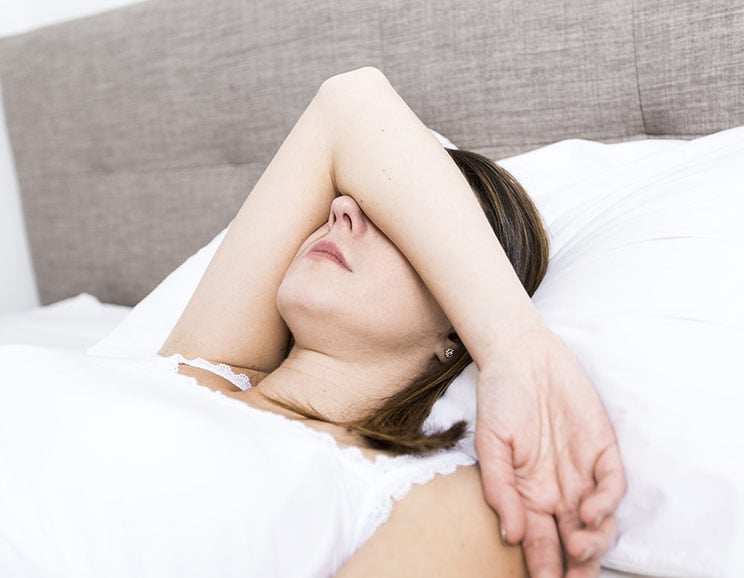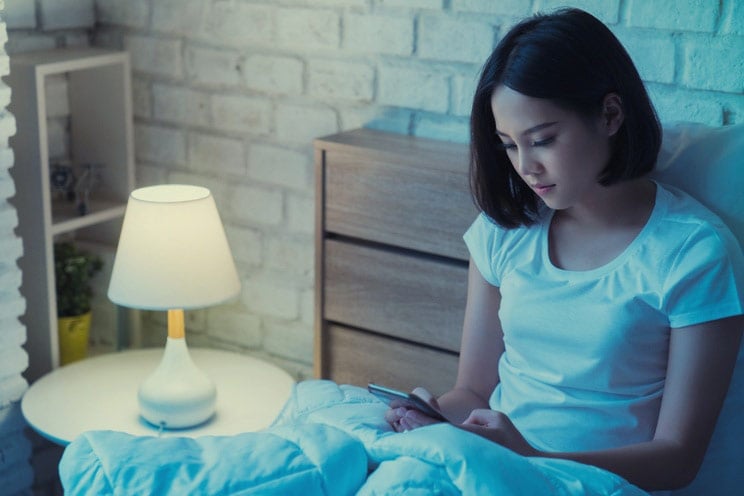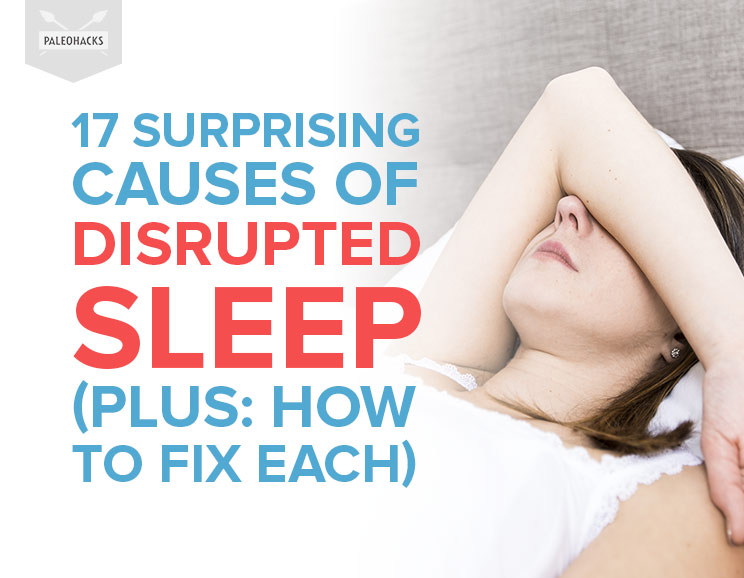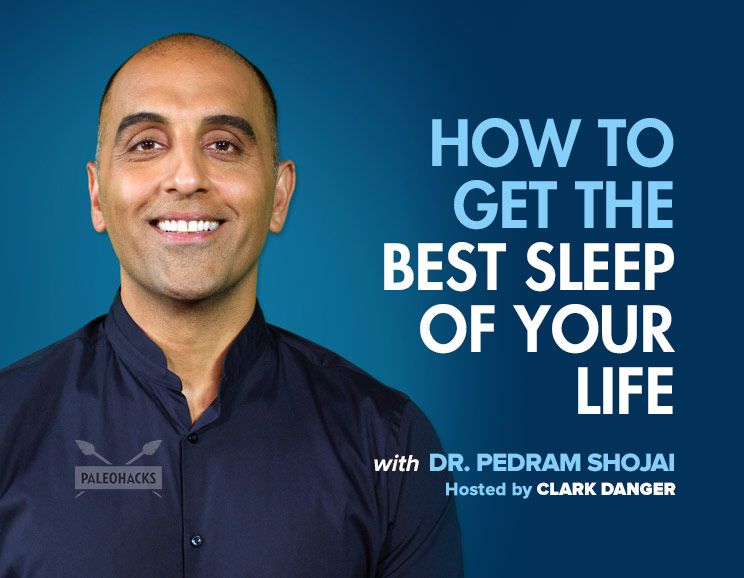Few things can sabotage a good mood or health than a week of disrupted sleep. Here’s what might be getting in your way of a solid night’s rest.
If you can’t remember the last time you slept well, take a look at this list to see if one of these things might be at the heart of your trouble.
While health conditions can certainly contribute to sleep disorders, sometimes the answer is a lot simpler than that. Tweaking just one or two lifestyle factors might be all you need to be sleeping better.
Do you wake up feeling fatigued, depressed, and restless? Break the cycle of bad sleep with our FREE Sleep Guide.
Click here to get your FREE copy of our Sleep Guide!
17 Things That Disrupt Sleep Plus How to Fix Each

From a problem-causing sleep environment to eating the wrong things too close to bedtime, these sleep problems are extra easy to fix with this helpful, straightforward guide. Remember: Nothing replaces personalized medical advice, so be sure to speak to your doctor about any medical or sleep concerns that you have.
1. Sleep Apnea
If you snore incessantly, you might have sleep apnea. This condition occurs when the throat muscles relax while you’re sleeping and can lead to a variety of problems, including snoring and breathing issues. If you constantly wake up feeling tired and can’t seem to get restorative sleep, check in with your doctor. Other signs and symptoms include dry mouth, headache in the morning, insomnia or frequent wake-ups, and generalized irritability. (1)
How to fix: Sleep apnea requires medical treatment in most cases but if you have a mild form, lifestyle changes can make a big difference. Lose excess weight and get regular exercise. Don’t drink alcohol before bed, and focus on sleeping on your side or stomach, not your back. (2)
2. Being Overweight
Carrying extra weight can increase your chances of sleep disorders like sleep apnea or insomnia. Plus, extra body weight can make it harder to get comfortable in bed.
How to fix: You don’t have to lose all the extra weight to notice an improvement in sleep quality. Even the simple habit of exercising on a regular basis can lead to better shuteye, which in turn can help stabilize metabolic factors that could make weight loss easier. (3)
3. Mild Depression

How to fix: First, work with your doctor to address any underlying factors. In the meantime, lifestyle changes can make a big difference. Try meditation before sleep, make sure to get time outside, and get plenty of exercise to improve your overall mood and boost your sleep quality.
4. Anxiety
Is worrying keeping you up at night? Whether anxiety keeps you from falling or staying asleep, if anxious thoughts are cutting into your shuteye, it’s time to find some workarounds.
How to fix: Anxiety can be caused by hormones, health conditions, stressful situations, pregnancy, postpartum, and many other reasons. Understanding your personal anxiety triggers is the best way to combat it, but regardless of the cause, simple lifestyle changes might work wonders. Try yoga before bed, cutting back on caffeine, and regular acupuncture sessions to get you into a calmer state of mind. (5)
5. Work Stress
If you can’t leave work at work, it can mess with your brain’s ability to shut off for the night. Tense jobs or high-pressured settings can take their toll, but even more so when you’re not getting enough sleep.
How to fix: Try changing up your habits. Leave work computers and phones at work, or don’t check your email after hours. At the very least, do not take them into the bedroom with you! Instead, consider occupying your brain with something else, like reading a book until you’re ready to close your eyes.
6. Alternative Work Schedule

How to fix: Upgrade your bedroom so it’s completely free from motion and light. Try blackout curtains and make sure the rest of your family knows to respect your personal bedtime. Create a bedtime routine and stick to it. Leave your phone outside of your room – disrupted sleep will be more of a risk for you if everyone else is awake.
7. Thyroid Issues
The thyroid is a powerful little organ that sits at the base of the neck and regulates metabolism and hormone levels. Yet when it’s over or underactive, it can leave you with insomnia and debilitating daytime fatigue. (7)
How to fix: Check in with your doctor if your thyroid issues are adding to your disrupted sleep schedule. You may need a medication change. If you’ve not had your thyroid tested, get a full work-up. Optimizing your thyroid health with hormone replacement, if needed, and lifestyle changes like diet and exercise can go a long way in providing relief.
8. Restless Legs
Restless leg syndrome is a disease with no known cause or cure, although research suspects it’s due to dopamine disruptions in the brain. (8)
How to fix: If the problem is minor or infrequent, try taking an Epsom salt bath or using magnesium oil to promote muscle relaxation. Speak to your doctor if the problem is more serious. You might want to get tested for anemia or iron deficiency, as there is a strong correlation between restless legs and low iron. Don’t take iron supplements unless directed by your doctor, however. (9)
9. Acid Reflux
There’s nothing quite like being so tired that you want to sleep, but every time you lie down, burning acid crawls up your throat. While many factors can cause reflux problems, talking about it with your doctor can determine if there are any underlying issues like food allergies that need to be addressed.
How to fix: While popping antacids every night can seem like an easy fix, most acid reflux is due to low levels of stomach acid, not too much. In other words, antacids can ultimately worsen long-term reflux. Instead, try to avoid trigger foods like spices, tomatoes, caffeine, alcohol, and others within three hours of bedtime. You could also try sleeping on a wedge pillow or with your head elevated. (10)
10. Too Much Alcohol

How to fix: Limit alcohol intake to a few beverages per week, and don’t drink within three hours of bedtime.
11. Drinking Caffeine Too Late
Research shows that caffeine up to six hours before bedtime can lead to disrupted sleep. So even if a 4 pm slump hits you, if you’re planning to sleep within the next six hours, refrain from having that extra cup of coffee. The same goes for caffeinated soda, tea, or any other source of liquid energy.
How to fix: Stop consuming coffee and other caffeinated beverages before 2 pm each day and limit daily intake to no more than 400 milligrams. (12)
12. Taking B Vitamins Too Late in the Day
B vitamin supplements are wonderfully energizing and, at the same time, calming for the nervous system. But taken too late in the day, these nutrients can interfere with the brain’s ability to relax into sleep or can lead to frequent wakings. B12, in particular, has this energizing impact.
How to fix: If you supplement with anything that contains B vitamins, singular or in a multivitamin, be sure to get them down before 2 pm each day.
13. Your Bedroom is Too Warm
Sure, it might feel cozy to crank up the heat, but sleeping in a room that’s too warm is a recipe for restless, disrupted sleep. Your body temperature naturally drops a little as you settle into a full night of REM and deep sleep. When this body temp drop can’t happen, sleep cycles can be disturbed, resulting in more frequent wakings.
How to fix: If your blankets are the culprit, invest in cooling blankets that won’t trap heat. Check your thermostat: the optimal sleeping temperature is between 60 and 67 degrees Fahrenheit. (13) If the problem is stagnant air, use a ceiling fan or a bedside fan to keep cool air circulating around you.
14. Too Much Screen Time

How to fix: The best thing to do is limit your screen time, especially at night. If you can’t put your devices away for a few hours before bedtime, try investing in blue blocker glasses.
15. Your Room Gets Too Much Light
Whether you’re sleeping during the day or you live in an area thick with light pollution, the brain has a hard time sinking into fully restorative sleep if the room isn’t completely dark.
How to fix: Get blackout curtains and remove nightlights or alarm clocks with a glow. Considering using a Sleep Crown pillow or a sleep mask for better light shielding.
16. Your Room Is Too Loud or Too Quiet
Some people can’t stand white noise, while others can’t sleep without it. Regardless, the noise situation in your room can have subtle impacts on your sleep quality all night long. If your room is too quiet, even the slightest change in noise could result in your brain being stimulated to wake up, resulting in disrupted sleep. If your room is too loud, even with white noise, it could be difficult to settle into a relaxed state.
How to fix: Experiment with the right level of noise-blocking machines or white noise. Start with your white noise machine at low or medium volume, and adjust from there.
17. You’re Low in Magnesium
Magnesium is a nutrient that helps the muscles in your body to gently relax and release tension. Low levels of magnesium can lead to disrupted sleep or insomnia and can also worsen daytime drowsiness. (14)
How to fix: Check with your doctor about getting your magnesium levels tested before trying a supplement. If supplementation is right for you, take it right before bedtime.
If these little tricks still leaving you tossing and turning, try our cutting-edge audio program, Primal Sleep! We’ll help you get 7-9 hours of deep, blissful sleep every single night to increase your focus, concentration, and energy the next day. Get restful, peaceful slumber night after night with Primal Sleep today.



 Back of Knee Pain? Try These 9 Gentle Stretches
Back of Knee Pain? Try These 9 Gentle Stretches









Show Comments